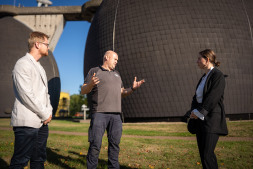
© Stadt Bocholt
Christian Schaffeld explains the special features of the Bocholt wastewater treatment plant to the guests from Denmark.Danish delegation visits Bocholt wastewater treatment plant
Expert dialogue on energy efficiency, waste gas reduction and climate protection in wastewater management
A small delegation from Denmark visited Bocholt's wastewater treatment plant at Brömmlingstiege in Liedern on Friday.
Laura Kalbus, wastewater management consultant at the Danish Consulate General in Hamburg, and Oscar Moerch, an employee of a Danish company specialising in wastewater purification and treatment, were informed by wastewater treatment plant manager Christian Schaffeldt about innovative processes in the operation of the plant.
Of particular interest to the guests was the high level of energy efficiency: the Bocholt wastewater treatment plant has been regarded as a pioneer for several years because, in addition to PV systems and the generation of electricity from digester gas using its own combined heat and power plants, it is operated almost energy self-sufficiently with its own wind turbine. Sewage treatment plants are traditionally among the largest energy consumers in local authorities - in Bocholt, this demand has been significantly reduced.
Another focus of the exchange was current strategies for reducing hydrogen sulphide (H₂S) in wastewater treatment plants. Schaffeldt explained to the guests various measures for reducing the toxic and corrosive gas, such as iron dosing, aeration, biological filters and the use of activated carbon. The preventive addition of oxygen to avoid the formation of H₂S was also discussed.
The reduction of climate-damaging gases, in particular nitrous oxide, was also discussed. This is mainly produced during biological nitrogen removal and is considered a strong greenhouse gas. Bocholt relies on modern processes, direct measurements and targeted control of processes to minimise emissions.
"We have been working for years to operate our plant as efficiently and environmentally friendly as possible", explained wastewater treatment plant manager Christian Schaffeldt from Entsorgungs- und Servicebetrieb Bocholt. "It is particularly important to us that we not only save costs, but also actively contribute to climate protection. The international exchange shows us that we are on the right track - and that we can learn from each other."
"The Bocholt wastewater treatment plant is particularly interesting for us because it is operated in a region that is very similar to the structure of Denmark - characterised by agriculture and intensive livestock farming. In terms of size, the Bocholt wastewater treatment plant would be one of the larger plants in Denmark", emphasised Laura Kalbus on the fringes of the visit.
The exchange took place as part of the German-Danish expert dialogue on "innovations in water management", which is organised by the Emschergenossenschaft and the Lippeverband, among others.


